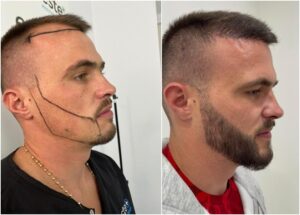The need for beard transplants, a surgical process that helps men grow a fuller, thicker beard, has increased dramatically in the field of cosmetic surgery in the past few years. How does beard transplant before and after is ?
What is a beard implant?

Beard Transplant Success Rate
A beard transplant’s rate of success is mostly determined by a number of variables, such as the surgeon’s level of experience, the patient’s general health, and the patient’s compliance with aftercare instructions.

Contemporary beard transplant procedures often have great success rates, with the majority of patients getting long-lasting, natural-looking results. Selecting a qualified surgeon and conducting in-depth research both greatly increase the chances of a favorable outcome.
Beard Transplant Recovery
Recovery from a beard transplant is an important stage that impacts the procedure’s outcome.

Redness, swelling, and scabbing around the transplanted location are typical healing symptoms. To reduce pain and encourage healing, it’s critical to keep the area clean, refrain from touching or scratching the transplanted hair, and take your meds as directed.
Depending on the particular method and the person’s healing capacity, the recuperation period following a beard transplant varies. While most patients are able to resume their normal activities in a matter of days, full healing, which includes the resolution of inflammation and redness, may require many weeks or even months.
How Much Is a Beard Transplant?
The amount of the operation, the method employed, and the clinic’s location all affect how much a beard transplant in Turkey costs.
The expenses associated with beard implants often cover anesthesia, post-operative care, facility fees, and the surgeon’s fees.
Potential patients ought to speak with several clinics
in order to get comprehensive quotes and guarantee that the services that are included in the total cost are transparent.
Is Beard Transplant Painful?
Due to the local anesthetic, patients usually feel no pain at all during the procedure. However, minor discomfort and mild pain are normal during the healing process and can be managed with recommended medications.



